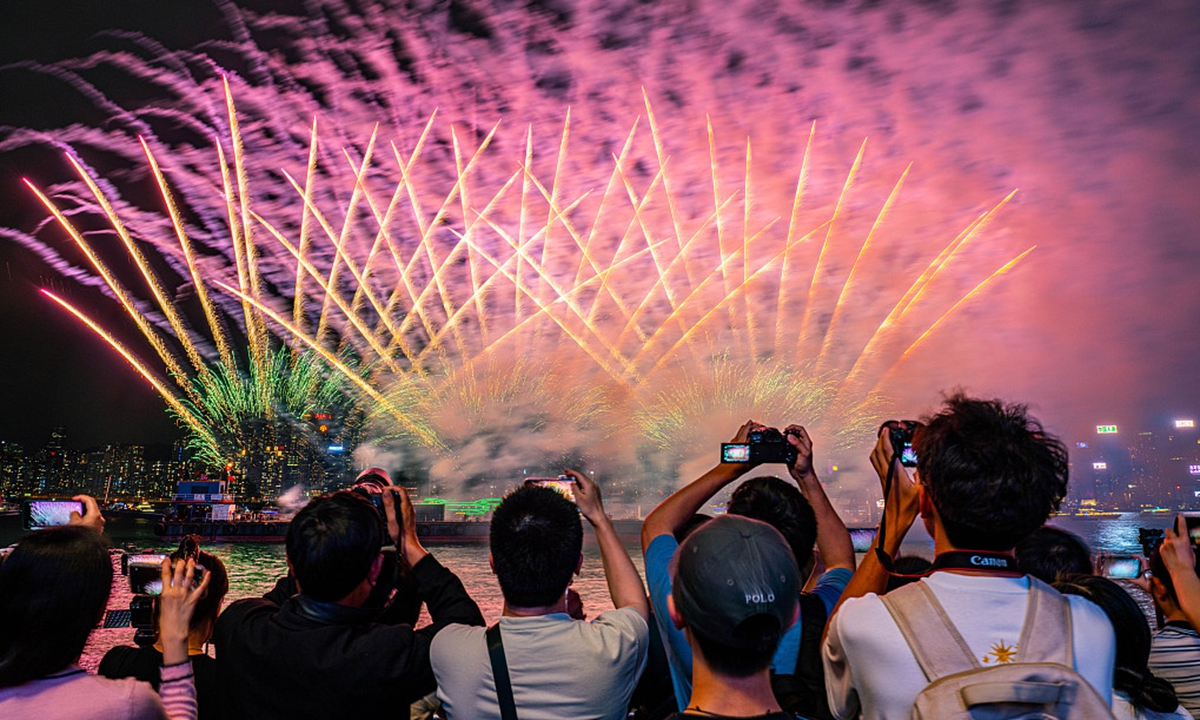
Visitors enjoy the fireworks that lights up the night sky over Victoria Harbour in Hong Kong on May 1,2024. Photo: VCG
The chief executive of the Hong Kong Special Administrative Region (HKSAR) announced on Tuesday that the city will hold 60 more major events in 2024, in a bid to attract more tourists, boost consumption and lift the regional economy.
The announcement comes as the Chinese central government has also taken steps to boost visits to Hong Kong and Macao. The plan to hold more promotional events will help the HKSAR to improve the competitiveness of its tourism industry, and attract more visits from both the Chinese mainland and other areas, experts said.
The number of major events for the whole year will increase from 150 to over 210, with 1.7 million tourists expected, John Lee Ka-chiu, the HKSAR chief executive, told reporters in Hong Kong on Tuesday.
In the second half of the year, 100 events are planned, including entertainment expos and fashion weeks. These events are forecast to generate HK$7.2 billion ($923.58 million) in consumption and add HK$4.3 billion in economic value for the city, according to Lee.
Hong Kong recorded 14.62 million visitors in the first four months of 2024, doubling the number from the same period last year, which will push HK's GDP up 0.1 percent for every increase of 1.5 million visitors, Lee said on Tuesday.
Lee highlighted the sharp rise in mainland tourists visiting Hong Kong, stressing its positive impact on the events economy. To capitalize on this, the SAR government will continue to request more favorable policies from the central government, such as increasing the tax-free quota for mainland visitors to boost retail, particularly luxury goods sales.
The Chinese central government has also taken major steps to support visits to Hong Kong and Macao, including extending the duration of business visits from seven days per visit to 14 days.
Furthermore, Lee emphasized Hong Kong's increasing hospitality capacity. Also, its aviation sector is expected to fully recover by year-end, attracting a greater number of long-haul travelers.
Lee stated that around 1,600 tour groups joined the local cultural tourism program organized by the government. Over 700 new itinerary routes were created through the tourism competition hosted by the Hong Kong Tourism Council. He highlighted ongoing innovation and adaptation in Hong Kong's tourism and related sectors.
The SAR government's "First Quarter Economic Report for 2024" revealed modest growth in Hong Kong's economy, with real GDP up 2.7 percent year-on-year. Service exports, especially in tourism and transportation, drove this growth, rising over 8 percent due to increased visitor arrivals.
In the past two years, there has been a decline in cultural and tourism spending in Hong Kong. Even local residents are increasingly opting to travel to mainland destinations like Shenzhen due to lower prices and convenient transportation, market observers said.
"Increasing events to boost consumption may be a long-term method. The government aims to redirect local spending back to Hong Kong while boosting confidence among all tourists, refocusing attention on the city," Song Ding, a research fellow from the China Development Institute, told the Global Times on Tuesday.
"Due to the importance of tourists from the mainland, Hong Kong needs to optimize its tourism market structure and enhance its competitiveness to attract more visitors and boost spending," said Adolph Leung Wing-sing, an official from HK's Office of the Government Economist (OGE).
"Hong Kong is a uniquely attractive tourist destination, combining Chinese tradition with Western charm as an international city. The added events amplify its distinctiveness and boost its competitiveness. I believe more tourists, both domestic and international, will visit in the future," Jiang Yiyi, a vice president of the School of Leisure Sports and Tourism at Beijing Sport University, told the Global Times on Tuesday.




